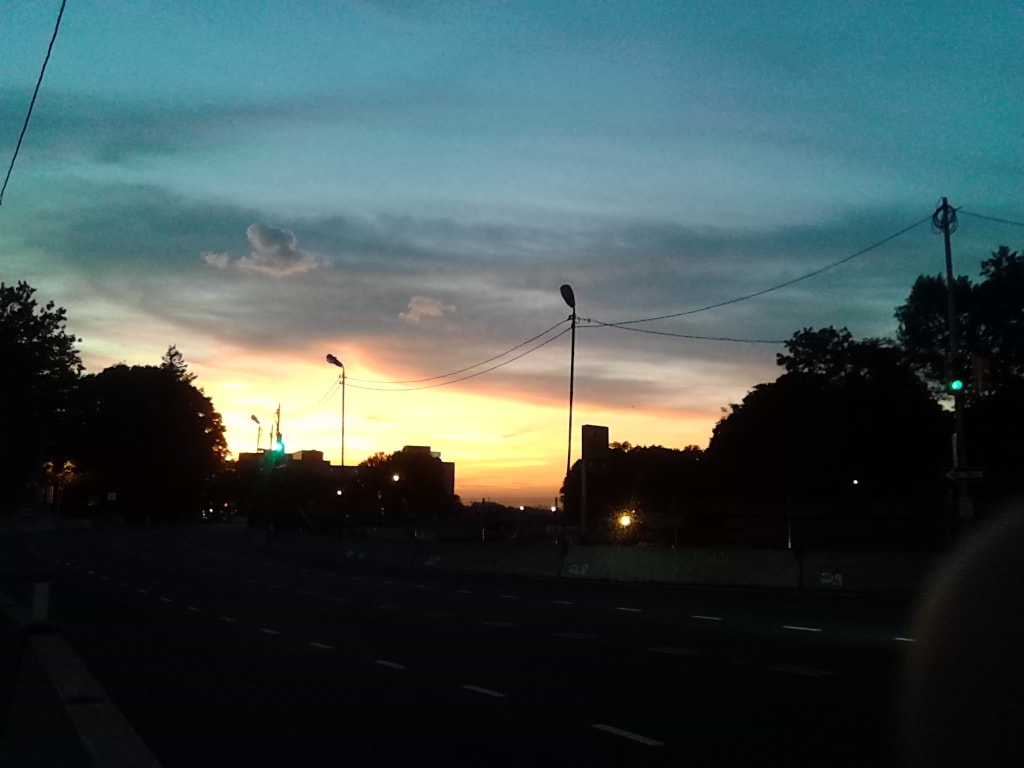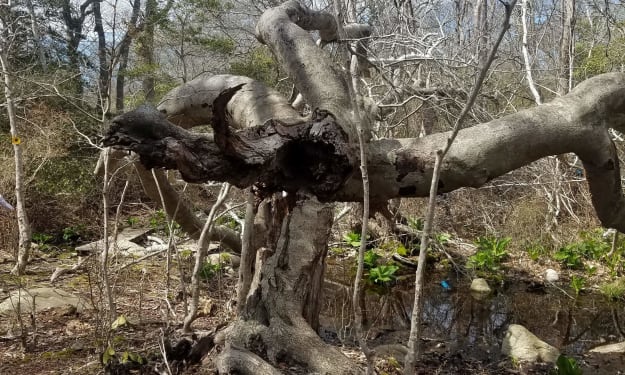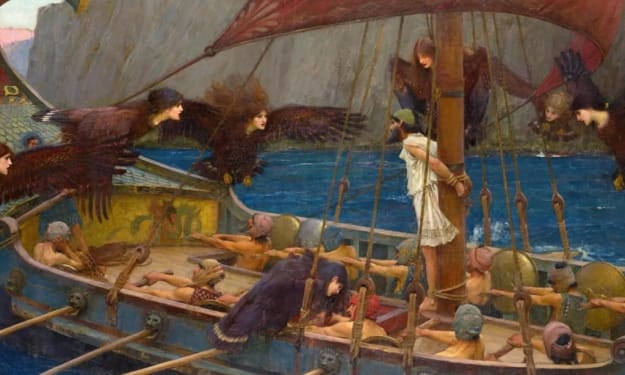Ninety-Six Hours
Know When To Run.

“The things you hate become the things you love when you’re desperate. I thought yogurt tasted nasty, I’m eating it now though. I’ve grown an affinity to it,” Sharon said.
“I thought my life was stripped down to the bare minimum, simplified to things that mattered,” Matthew said, holding a brown spotted banana. “Being forced to stop everything made me see all that I took for granted. I had to have this, I had to do that. My life wasn’t simple at all.”
In ninety-six hours, their lives had changed forever. Two strangers at the Lo-Lo Mart on Route 978, had locked themselves in a closet to stay alive. The odd circumstances that brought them together were improbable and yet, happening right now.
They were too afraid to eat but had to. On day one, the Yodels looked divine. After being locked up for three days, they were not appetizing anymore. None of the food looked good anymore. They had begun to force themselves to eat.
The Lo-Lo Mart stores were small. Their shelves were stocked with everything one should not need but did need at 3 am. So many shelves, customers could not tell if the walls were painted. The floors always had lumpy water-soaked kitchen patterned tiles, certainly not for industrial use.
The cuisine was the best man-made calamities on earth, things that nature never intended. Things that made God look down and say, “What have my humans created now?” Honey glazed talc flour donuts, chemical laced candies, and nitrogen-fried burgers topped with chalk dust buns. Savor the triglycerides, savor the fructose, and indulge in the dutiful carbs that would store enough fat in the body to last three hibernated winters.
“I’m a hostage to this damn place, by the time we leave, I’ll be in love with everything here. It’s like that um… Stockholm Syndrome?” Sharon said.
“Stockholm Syndrome, you know about that?” Matthew said.
“Why wouldn’t I?”
“I asked because my grandfather is the only person I know, who talks about Stockholm Syndrome. Didn’t know what it was, he had to explain it to me.”
Sensing tension, she let it drop and started a new conversation. She needed this stranger if she was going to live. Right now, they needed each other, all societal issues had to be placed on hold.
“I like old spy movies. Three Days of the Condor is one of my favorites,” she said.
“My dad has the book Six Days of the Condor on his shelf. My grandfather probably gave it to him,” he said.
They heard a sound that scared them. Both jumped and looked up nervously. Fear looked the same in Black or White. It was only thunder and rain pounding on the roof, interrupting their conversation, and slapping their faces with reality.
The thunder triggered flashbacks that took them back to days earlier. While standing at the counter waiting to pay, they heard a sound outside like cars being smashed and people being beat. The on-duty overnight clerk panicked. He swore it was his own car, which was parked in the one employee slot near to the restroom, being trashed. He ran out to check, leaving the two sole customers, Sharon and Matthew, in line at the check-out. Neither complained. They understood and would have done the same thing.
Half a person’s income went to car insurance and maintenance. Good luck getting medical as a part-time worker. Obamacare plus $150 per month competed with gas money and gas money had to win or there would be no job to go to in the first place. Walking was out of the question. The roadways were a speed demon’s paradise equipped with dark desolate service roads, no pedestrian passageways, surrounded by creepy ten-foot weeds. So, they waited and here they were.
“What were your days like before?” She said.
“You mean work?”
“I mean everything.”
“Most days work in my office. After work get whiskey at a bar and the weekends, cycle up the Interstate to the ChaChekie Mountain.”
“You’re one of those Chekie guys, right? Terrorizing pedestrians on the pedestrian bridge.”
“You walk the bridge?”
“Why wouldn’t I? You assume I don’t walk the bridge?”
“Don’t get upset. I don’t know what you do.”
“You assume one way and not the other. I got a few scrapes from you guys dodging your wheels on the bridge then you ride so fast no one can catch you. I should make you level up.”
“See that’s the problem, it’s not a pedestrian bridge, it’s a shared pathway. Bikes have a right to it just as walkers do.”
“and where do you drink your whiskey?”
“Uh, all over. Downtown Hub or up by Merc Street.”
“Which place on Merc Street?”
“Uh, yeah, uh, a place called Alabaster Glass.”
“Yeah, I know Alabaster.”
“You do?”
“You afraid to tell me. Don’t worry, I don’t go there. I go to Murphs Rye & Dry. Throw me a Rittenhouse anytime.”
“I not afraid to tell you. It’s open to public, anyone can go. Rittenhouse, I never would have suspected.”
“You thought I wouldn’t know whiskey, didn’t you?”
“I wasn’t sure.”
“Well, why not just ask?”
“You’re right. I see your point.”
He searched his mind. Had he ever even spoken to a black woman for this long before? Let alone been alone with one in a confined space. He thought he was a progressive, she made him feel like a right-wing conservative.
She stared at him, wanting to believe in his sincerity.
Before the crash and chaos, they could have ignored each other based on race but the bloodied and bludgeoned body of the on-duty overnight clerk rolled into a tarp outside the door, granted them instant civility and racial healing.
Forty-eight hours ago, the on-duty overnight clerk had returned, unrecognizable. His right arm and nose ripped off. He begged them not to go outside. Sharon and Matthew were astonished at how a human being could be destroyed so suddenly. They took him to the back and tried to tend to his wounds, to no avail. He bled to death, a painful and agonizing death.
They heard noises, screaming and environmental chaos outside. They took the advice of the dead-clerk and stayed in. They ran to the furthest part of the back of the store, found a down staircase and locked themselves in an oddly large storage closet, where they now lived. The noise blew through the Lo-Lo Mart like a typhoon, then subsided, restarted, and subsided again.
It sounded like hell and their cellphones were not working. No one had found them down there and although they wanted to get out, they were beginning to think that was a good thing.
“You married?” She said.
“Widowed. My wife died on our first wedding anniversary,” he said.
“I'm sorry. How did it happen?”
“Fentanyl. Accidental overdose.”
“Damn that’s deep. Was she an addict?”
“No, she wasn't. It was prescribed. We struggled through rehab. Our families want me to sue the drug company.”
“I lost family members to crack when I was little, but no one put them in rehab.”
“Why not?”
“People said crackheads brought it onto themselves. They didn't need rehab, they needed jail.”
“You guys should have fought against that.”
“We did, no one listened.”
He stretched out his hand and grabbed a can from their stash.
“Beer?”
“No. Another thing I thought I’d never do, have a choice between beer and water, and choose water.”
“I should join you, but my ten-hour beer fast is over. I gotta have a least one.”
“I’m afraid to drink. I don’t want to go to the bathroom again. I mean water’s no better, but beer runs through me like ten rivers.”
“Don’t force yourself to suffer. You’ll have to go sometime no matter what you drink. Look, there’s a bucket in here. We’ll put some water in it, just go in there. When we go out again, you can empty it.”
“Okay. I can do that.”
He got up and walked over to the sink.
“Damn.”
“What?”
“No water. It’s my turn to go out. Maybe it’s fine upstairs. What do you need?
“Get fruit. We need to eat that before it goes bad. The synthetic stuff will last three years.”
“The bananas are gone. The apples and pears should be okay. I’ll get the last of the milk and yogurt.”
“You know what? Let me go with you.”
She grabbed her bag. They opened the door. It was quiet. This is where Sharon did not do well, and Mathew had to man up (although he was afraid to).
“The lights are still on. That’s a good sign, isn’t it?” She said.
“Sure,” he said.
Sharon did not want to cry. Matthew would think she was weak and leave her behind. She was slightly claustrophobic and refused to show it. She remembered how her daddy would always tuck her in at night. He would hold her hand and walk her to the bathroom when she was a toddler taking that last walk down the hallway to the bedroom. He called her at college every Wednesday night, disguising the call as a well-being check-up, she knew he was continuing to tuck her in.
Matthew wondered why he got stuck with Sharon but didn’t want her to feel bad. He missed his wife. If she were alive, she and their unborn child would have been there with him. His parents, both cancer survivors, depended on him. He had already been away from them for too long. He was afraid worry would bring their cancer back. He knew they were heartbroken not to have grandchildren by now, losing him would be too much.
“Before we go up, let’s use this masking tape and tape your shoes to your foot,” he said.
“I thought I’d be out here for a minute and just threw on these fuzzy flip-flops. God, give me another chance, and I’m wearing sneakers every day,” she said.
“I don’t see any scissors.”
“I got that right here in my bag. They’re for protection.”
“That’s smart.”
“A necessary thing for a girl.”
He taped her feet up.
Suddenly, the lights went out.
“What the hell is this?” She said.
“Don’t panic,” he said.
She began to pray.
He stood motionless, not knowing what to say or do. They heard the floor to ceiling windows crash, accompanied by the moaning of a thousand people. The sound grew louder and unruly. Shelves were crashing to the ground, bottles were breaking, and explosions were happening outside.
They abandoned their plans to go upstairs and decided to run out the back corridor. They found an exit door that lead to a parking lot. They peered through the small door window.
Beyond the lot was the 978, across that, a grassy knoll and then miles and miles of ten-foot weeds.
The main thing was the back lot was clear of any foul activity. It was peaceful as if nothing was happening at all. It would not be for long. The way things sounded they knew whatever was coming would eventually devour and crush them.
The noise from behind them was getting louder and louder. The building sounded as if it was being demolished from the inside, folding in like an accordion.
“We have to go for it,” he said.
They opened the door and ran across the lot to 978. No cars were in sight of the eight-lane roadway. Out of force of habit they looked to the left and saw no cars coming, then they looked to their right at a red-light. They waited, as their parents taught them.
It turned into a greenlight.
“What was her name?”
“Diana.”
Matthew grabbed Sharon by the wrist. They ran across 978, into the untamed wilderness. The silhouette of the two displaced strangers disappeared into the weeds as the ChaChekie waited for them in the horizon.






Comments
There are no comments for this story
Be the first to respond and start the conversation.